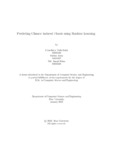| dc.contributor.advisor | Shakil, Arif | |
| dc.contributor.author | Saleh, Chowdhury Nafis | |
| dc.contributor.author | Alam, Farhan | |
| dc.contributor.author | Khan, Md. Jawad | |
| dc.date.accessioned | 2022-09-05T05:39:35Z | |
| dc.date.available | 2022-09-05T05:39:35Z | |
| dc.date.copyright | 2022 | |
| dc.date.issued | 2022-01 | |
| dc.identifier.other | ID 18101450 | |
| dc.identifier.other | ID 18101197 | |
| dc.identifier.other | ID 18101268 | |
| dc.identifier.uri | http://hdl.handle.net/10361/17160 | |
| dc.description | This thesis is submitted in partial fulfillment of the requirements for the degree of Bachelor of Science in Computer Science, 2022. | en_US |
| dc.description | Cataloged from PDF version of thesis. | |
| dc.description | Includes bibliographical references (pages 29-32). | |
| dc.description.abstract | Climate change has been causing devastation on the economy of the country and the
world as a whole. The study aims to determine how climate change would impact
the frequency and severity of one of the major natural disasters which is flood. Data
sets containing information about the rise of global temperatures, annual rainfall, sea
level rise and flood occurrences were surveyed and assembled. Different attributes
from the assembled datasets were then taken out and spliced into datasets that suit
the scope of our research. A plethora of machine learning algorithms have been
used to develop different prediction models based on the constructed datasets. Algorithms
employed in the development of flood prediction models include: “Logistic
Regression”, “Decision Tree”, “K Nearest Neighbors”, “Support Vector Machine”,
“Random Forest” and “Ensemble Learning”. Projection models were then trained
by employing an “Autoregressive” approach for generating projection data, which
were a prerequisite for the flood prediction models in making predictions of future
flood incidents. And with the aid of the generated projection data, predictions of
flood incidents were made for the years starting from 2022 to 2050. | en_US |
| dc.description.statementofresponsibility | Chowdhury Nafis Saleh | |
| dc.description.statementofresponsibility | Farhan Alam | |
| dc.description.statementofresponsibility | Md. Jawad Khan | |
| dc.format.extent | 32 pages | |
| dc.language.iso | en | en_US |
| dc.publisher | Brac University | en_US |
| dc.rights | Brac University theses are protected by copyright. They may be viewed from this source for any purpose, but reproduction or distribution in any format is prohibited without written permission. | |
| dc.subject | Flood prediction | en_US |
| dc.subject | Climate change | en_US |
| dc.subject | Machine learning | en_US |
| dc.subject.lcsh | Machine learning | |
| dc.subject.lcsh | Artificial intelligence | |
| dc.title | Predicting climate induced floods using machine learning | en_US |
| dc.type | Thesis | en_US |
| dc.contributor.department | Department of Computer Science and Engineering, Brac University | |
| dc.description.degree | B. Computer Science | |

